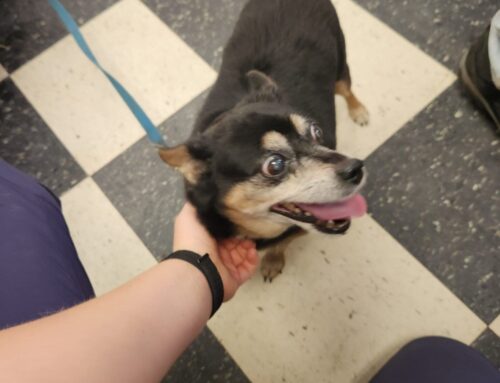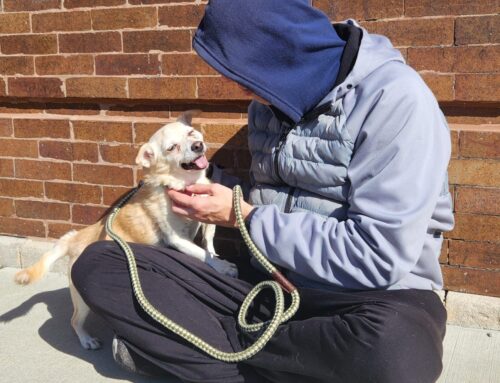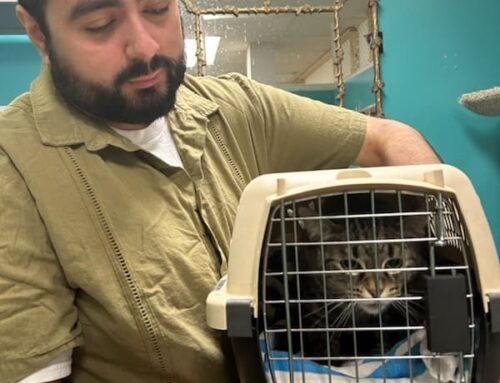Compassionate Care for Senior Animal Companions: Why It’s Important and How You Can Help

Charlie is a senior dog at our rescue who is in need of a little extra care in his twilight years. Each week, he goes to the vet to have fluid drained from around his heart, a labor-intensive process that requires a lot of time and effort. But for those who care for Charlie, it’s all worth it to see him comfortable and happy. Charlie’s story is a reminder of the importance of caring for senior cats and dogs, who require a different type of care than their younger counterparts. As animal companions age, they may develop age-related health issues that require more attention and monitoring. But with the right care, senior animal companions can still live happy, fulfilling lives, just like Charlie. In this blog post, we’ll explore why it’s essential to care for senior cats and dogs, what’s involved in their care, and provide statistics on how many are surrendered to shelters.
Why Care for Senior Cats and Dogs?
Senior cats and dogs have unique needs and challenges as they age, and it’s essential to provide the care and attention they require. Here are some reasons why caring for senior cats and dogs is vital:
-
Health Issues: Senior animals are more prone to age-related health issues such as arthritis, diabetes, and cognitive dysfunction. By providing regular veterinary care and monitoring, we can detect and treat these issues early to keep our animal companions comfortable and healthy.
-
Emotional Support: Senior animals often have a deeper bond with their human companions and can provide emotional support during challenging times. They may also have less energy and require less exercise, making them ideal companions for older adults.
-
Loyalty: Senior animals have a lifetime of loyalty and love to offer, and caring for them in their golden years is a way to show gratitude for their years of companionship and devotion.
What’s Involved in Senior Animal Companions’ Care?
Caring for senior cats and dogs involves several essential components:
-
Veterinary Care: Regular veterinary check-ups and preventative care are critical to detecting and treating age-related health issues early. Senior animal companions may require more frequent check-ups than younger animals, and their diet may need to be adjusted to accommodate their changing health needs.
-
Diet and Nutrition: Senior animal companions often require a different type of diet than younger animals to support their changing nutritional needs. Senior pet food is typically lower in calories and higher in protein to support muscle maintenance.
-
Exercise and Mental Stimulation: While senior animal companions may not need as much physical exercise as younger animals, they still need mental stimulation and regular activity to keep them happy and healthy. This can include short walks, puzzle toys, and interactive playtime.
Statistics on Surrendered Senior Animal Companions
Sadly, many senior animal companions are surrendered to shelters each year. According to the American Society for the Prevention of Cruelty to Animals (ASPCA), approximately 6.5 million companion animals enter shelters each year, and senior animals are among the most vulnerable. The ASPCA reports that senior dogs have the highest risk of euthanasia in shelters, with a 20% chance of being euthanized, compared to just 5% for younger dogs.
Don’t Surrender A Senior Animal
Surrendering a senior cat or dog should be an absolute last resort, as it can have a devastating impact on their emotional and physical well-being. Senior animal companions are often more sensitive to changes in their environment and can become stressed and anxious when they are separated from their human companions. They may also have a harder time adjusting to shelter life and be at higher risk of developing health issues. By choosing to care for senior cats and dogs through all stages of life, we can provide them with the love, attention, and support they need to live out their golden years in comfort and happiness.
In Conclusion
As individuals who share our lives with animal companions, we have a responsibility to care for them through all stages of life, including their senior years. Providing senior cats and dogs with the care they need requires time, effort, and resources, but it’s a small price to pay for the loyalty and love they provide us throughout their lives. As the saying goes, “The greatness of a nation and its moral progress can be judged by the way its animals are treated.” Let’s show our animal companions the love and respect they deserve by providing them with the care they need in their golden years.





